Ramona and the Love of Place
Or: How a 19th Century Activist Novel and a Super Bloom Taught Me to Love My Home
“How can we live without our lives? How will we know it’s us without our past? … They say and looked at it and burned it into their memories. How’ll it be not to know what the land is outside the door? How if you wake up at night and know – and know the willow tree’s not there? Can you live without the willow tree? Well, no, you can’t. The willow tree is you.” John Steinbeck, The Grapes of Wrath
When people ask me what I miss most from my childhood in California, it isn’t Disneyland or proximity to the Hollywood sign. There is so much that I miss. The used bookstore I spent hours in after I got my driver’s license. The craft coffeeshops around every corner. The pepper tree in our front yard. Weekly beach days in the summer months. Fourth of July in the Sierra Nevada. The winding trails through the brush and mustard grass behind my grandmother’s house. The sunlight crawling over the hills early every morning. All these little things, but what I miss most are the mountains. I loved that, if you so choose, you could be 6,500 feet high in the morning, in the desert midday, and at the beach by the evening. This beauty shaped the person I am today.
But I almost didn’t let it.
I’ve learned, especially since moving to the south, that people don’t always think of California’s warm loveliness first. Usually, the first comment raised to me after discovering where I’m from is something about the political climate. Some are surprised when I tell them I grew up in a normal Christian community (aside from the Dispensationalism but that’s another story) and couldn’t name a single blue haired lesbian if I tried. Of course, there’s little harm meant in these comments, but I do find them somewhat insensitive. My affection for the place that I’m from runs deep, it shaped my loves, and I hate to see it reduced to cheap political jabs. Especially when leaving California was one of the hardest things I’ve done.
Like I’ve teased, I didn’t always feel this way.
Growing up I was extraordinarily bookish. A blessing, for I assume, obvious reasons, and a curse. I thought reading was better than literally everything else. To highlight my point, I once brought The Hiding Place to an Angel’s baseball game… because baseball was boring, I guess? The pretension I embodied at this age makes me cringe today. I hated getting wet, so on our frequent beach trips I would sit all day in the sand, reading and waiting to go home. I can remember, probably sometime in late elementary school, begging my mom to go to my grandma’s for the day, so I didn’t have to go to the beach. Ugh. The. Beach. Am I right?
In middle school we started attending a small Christian school about 20 minutes away, with traffic. (Every good Southern Californian knows that you must calculate the traffic time, and we all have suggestions for the best route to your destination. Anyone ever watch the Californians SNL skit?) This required us to hop on the freeway. We drove along dry brown hills, passed shaggy palm trees and stucco strip malls, and got stuck in long lines of LA traffic. I can remember thinking the entire state was parched and ugly and full of too much stucco. Now, a pang of nostalgia always hits me when I find the rare stucco clad house in Georgia. I complained in my heart about this desert state, wondering what view my mom was pointing out on our way to the far north Sierra Nevadas in the summer.
Two things happened to change my view: in 9th grade I read Helen Hunt Jackson’s Ramona (checked out from my local library covered in… you guessed it, stucco)1 and in 10th grade we experienced a Super Bloom.
Ramona is Jackson’s second book. The first, A Century of Dishonor, highlighted injustices done to the Native Americans at the hands of the federal government. The book was not as successful in its mission as Jackson hoped.2 Full of too many facts, and not enough fiction, it garnered little sympathy. Ramona, on the other hand, was a bestseller. Realizing her earlier mistakes but still desiring to spread awareness of the plight of Native Americans, Jackson nixed statistics and wrote a story.
Ramona is about a young Scottish/Native American girl raised at a hacienda by a Spanish matriarch. The story involves the three separate cultures (more if you count the hundreds of different Californian tribal cultures), and it continues to pit these against each other. Ramona, as a young woman, meets a Native American man named Alessandro and the two fall in love. Desperate to be together but forbidden to marry by Ramona’s guardian, the two run away and are married by a Spanish priest. The rest of the novel chronicles their flight into the hills and various challenges that arise from their interracial marriage. The novel is ultimately a tragedy. And thus, it accomplished Jackson’s goal of capturing the public’s sympathy. The sympathy, however, was not enough to move anyone to greater reform on behalf of the Native Americans.3
Its sentiment did, however, work on my heart to a somewhat different end. No longer living in Jackson’s era, I began to see my home as a place of history and romance. In addition to realizing that my state had a blood soaked past when it came to Native Americans (just google the “California Genocide”), I began to see the land through the lens of story. On evening jogs, I imagined Ramona and Alessandro fleeing through the hills. Over the top, perhaps, but it worked. Jackson described places I had known all my life but in beautiful language. Seeing our local mountains and hills through the lens of the story, I realized that my home had a past filled with colorful characters.
It was this realization that I lived somewhere that had a deep past, a place where extraordinary things had happened, a place capable of romance, that began to melt my teenage angst about desert sand and suburbs. Jackson had hoped that her novel would spark reform, and while it didn’t do so in its time (people preferred it for the nostalgia for Old California it evoked)4, it did open my eyes to both the injustices and the beauty of my home. It complicated the place I grew up in. And for that, I began to love California.
It was the Super Bloom, however, that forever melted my stubborn heart.
In 2019, after a year of more than usual rain, our bare hills erupted, not in flames (at least not this time), but in orange poppies, purple lupines, and yellow mustard. It was astounding to see. After a lifetime of griping and groaning about the barren fire eaten hills it was the closest glimpse of “all things new” I have seen. My eyes are filling with tears just remembering it.5
Of course, people being people, they trampled the flowers for Instagram photos. I didn’t participate in this nonsense, but I did steal some poppies on walks through the brush clad hills behind my grandmother’s house and press them into my favorite books.
She is so far from ugly, my desert garden of a state.
It was beauty that moved my heart to love the place I once thought barren. The beauty of a novel, the beauty of green and color after years of brown. It was this beauty that freed me to begin to love other aspects of home.
Nothing sharpens love for a place like leaving does. My parents planned to move shortly after I would graduate from high school. So, I had one year with full knowledge that I would be losing my childhood state and house. I spent this year visiting San Clemente and Old San Juan, taking pictures of the hills, sipping coffee in my favorite suburban gems (when the pandemic allowed at least), visiting my favorite used bookstore (in a stucco strip mall!), taking pictures of all the stucco clad buildings, visiting the Getty museum, traipsing through the hills, walking along the beach (still not much of a water girl), and savoring every moment in the mountains. On my way home from school that year, I would drive over this one particularly tall hill and look across at the mountain peaks and down at our suburban city below and want to cry for how lovely it all was. And this was COVID! The politics were not great, but my love for the place had only deepened.
It's hard to know, in this modern age, how much a landscape shapes a person. I firmly believe the land I grew up in, even in the suburbs, shaped me. I love long sweeping views, and I love having the full picture, the eschaton view. California taught me to look for beauty, to be patient with a place, to see even the most unlikely places as vessels of personal history.
It’s oft been quoted, but Dostoevsky was right, beauty will save the world. It was the beauty of a novel and the beauty of green after drought that taught me to truly love my home. If you haven’t before, pick up a novel set in your own state or town, if you can find one that specific. I guarantee you it will cause you to see where you live differently. Look up the local flora and fauna. Try to spot these things on your walks and drives. These particulars have a way of working on the heart.
To end, here’s a poem about Southern California from Dana Gioia.
California Hills in August
I can imagine someone who found
these fields unbearable, who climbed
the hillside in the heat, cursing the dust,
cracking the brittle weeds underfoot,
wishing a few more trees for shade.
An Easterner especially, who would scorn
the meagerness of summer, the dry
twisted shapes of black elm,
scrub oak, and chaparral, a landscape
August has already drained of green.
One who would hurry over the clinging
thistle, foxtail, golden poppy,
knowing everything was just a weed,
unable to conceive that these trees
and sparse brown bushes were alive.
And hate the bright stillness of the noon
without wind, without motion,
the only other living thing
a hawk, hungry for prey, suspended
in the blinding, sunlit blue.
And yet how gentle it seems to someone
raised in a landscape short of rain—
the skyline of a hill broken by no more
trees than one can count, the grass,
the empty sky, the wish for water.
Copyright: 1986 Dana Gioia, from Fire and Rain: Ecopoetry of California.
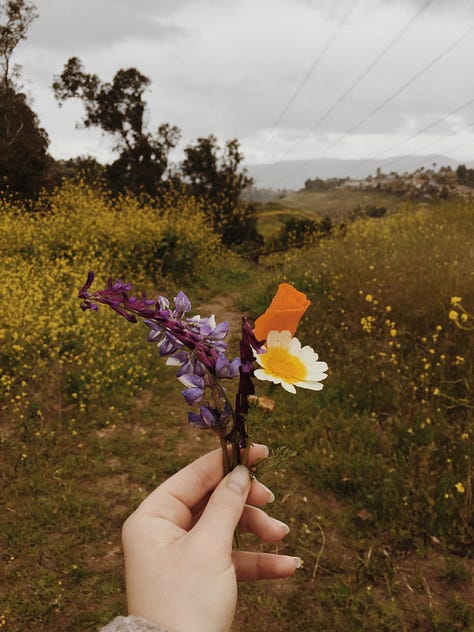
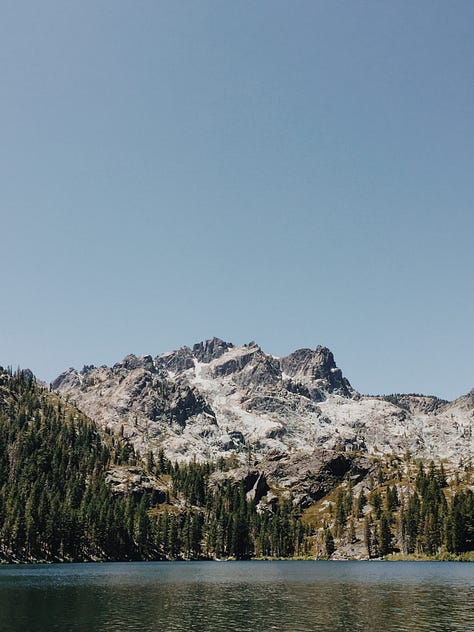
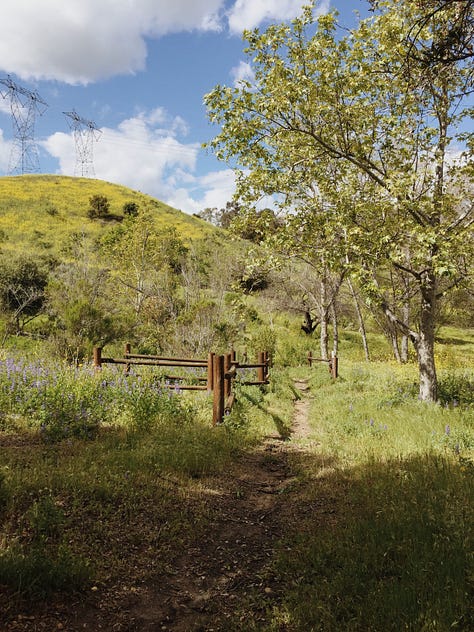
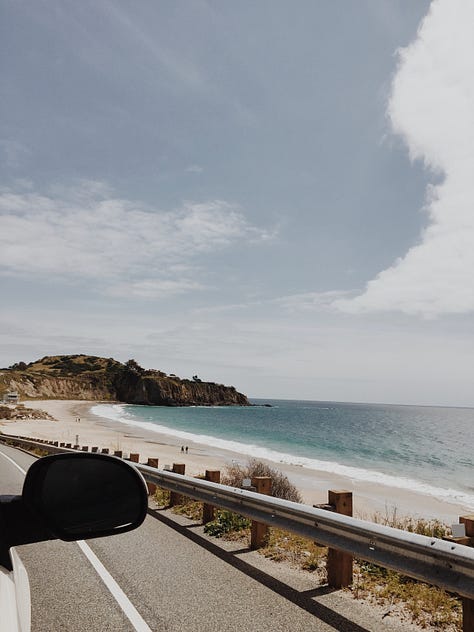
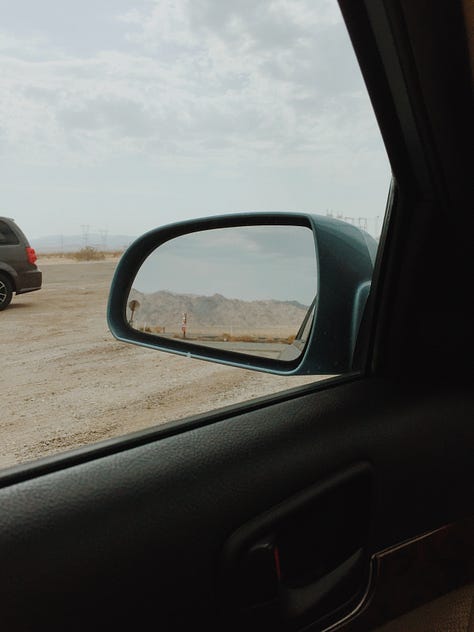
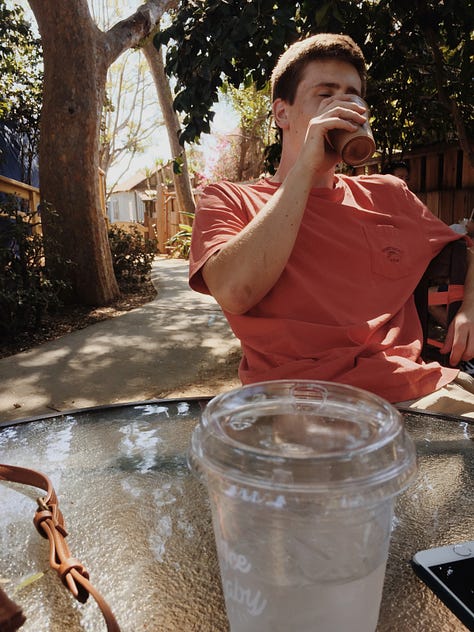
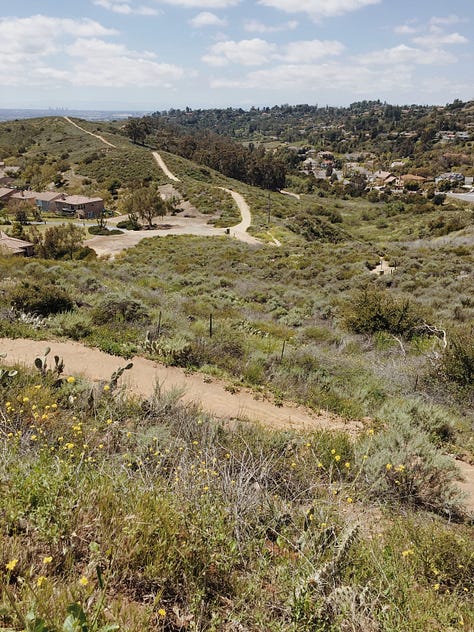
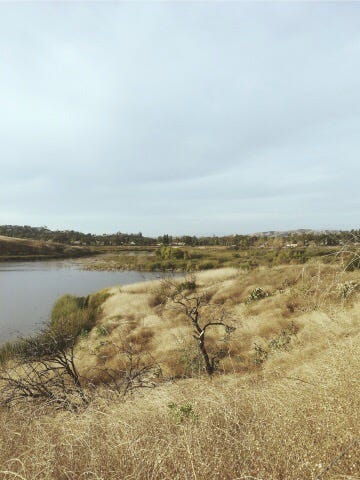
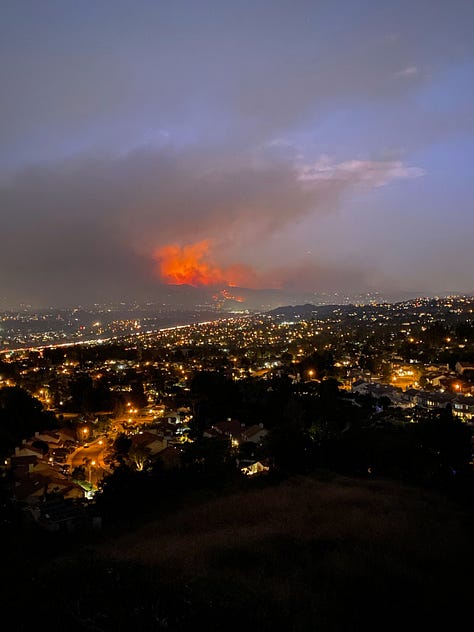
She’s been demolished and is now an In-N-Out. It’s weird when your memories lose their home. That library introduced me to so many good books. I learned to read there, went to story-time there, volunteered at their used bookstore, checked out many a life changing book, took Russian lessons there. It had a rose garden and a fountain outside that my siblings and I threw pennies in. It had sunny window seats. It was wonderful.
See above link.


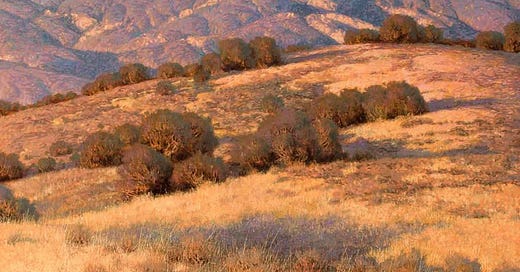


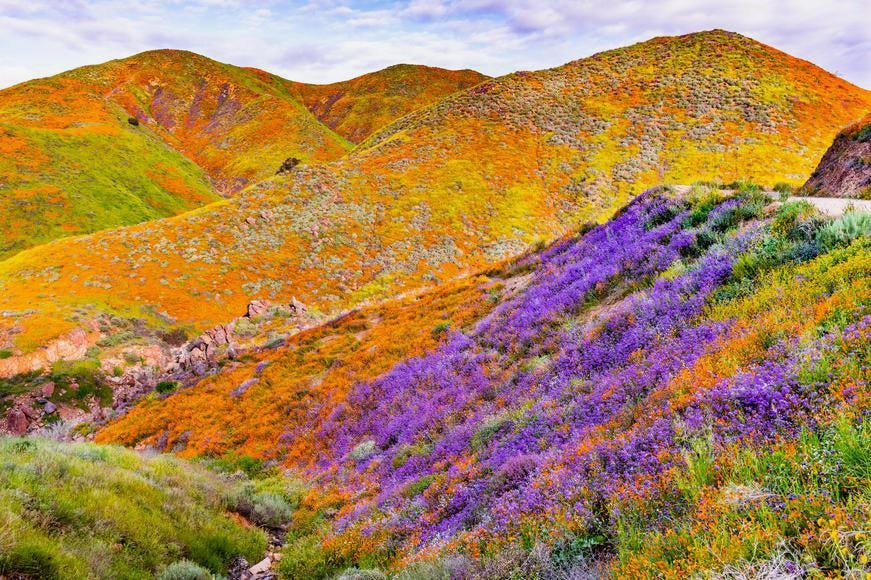
I’m sobbing, this was beautiful, I have no words big sis. I think about home every day, truly
Oh you KNOW how I feel about California. Even though I grew up in the Bay Area, bit of a different climate, different landscape, so much of what you said resonates with me as well. And that poem made my heart ache. I’m so appreciative of the opportunity to live in Georgia, and to have experienced Texas for a short time, but nothing will ever quite compare to the Golden State 💛